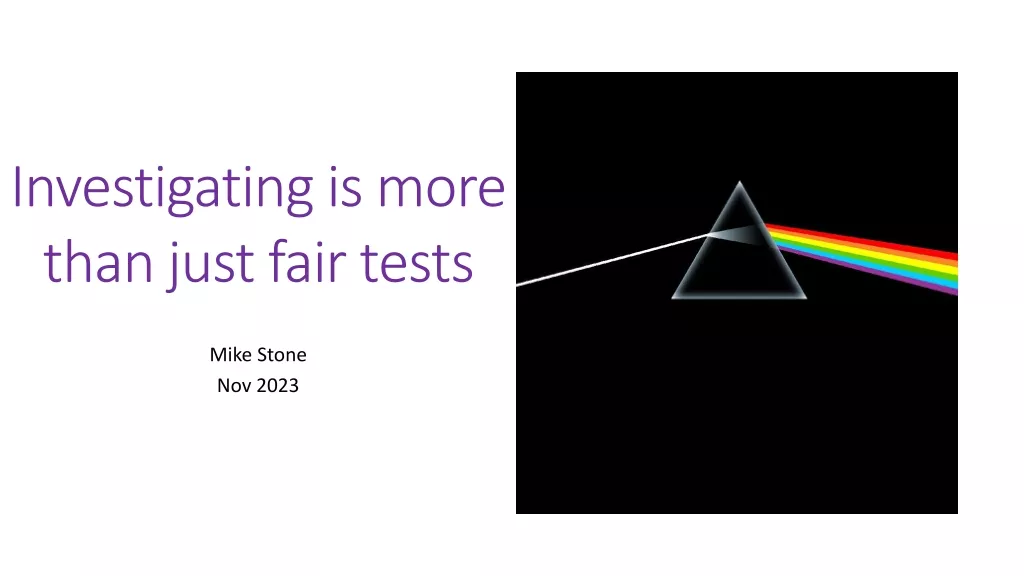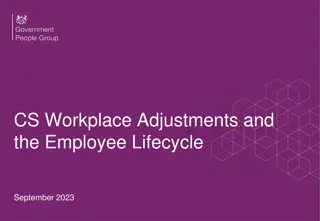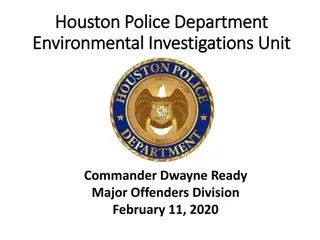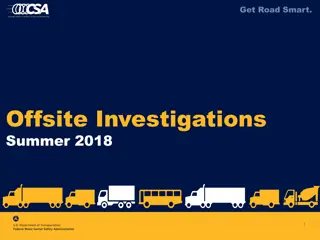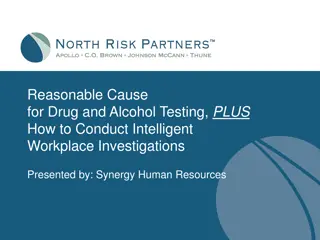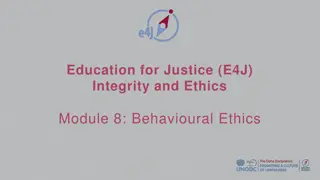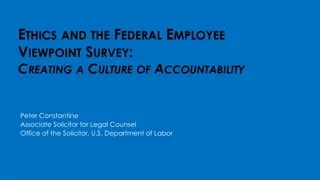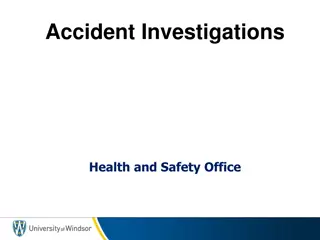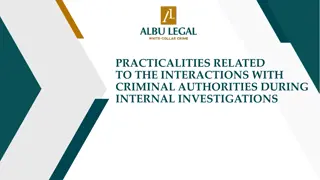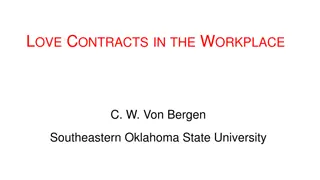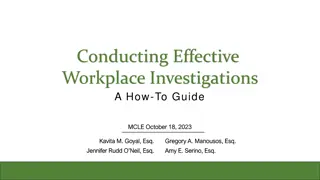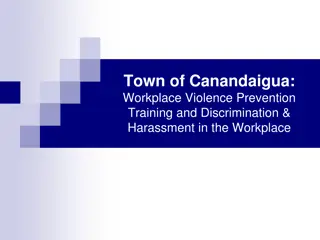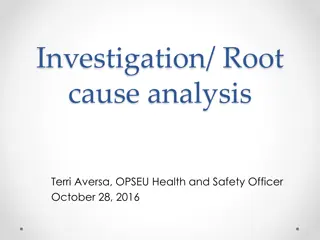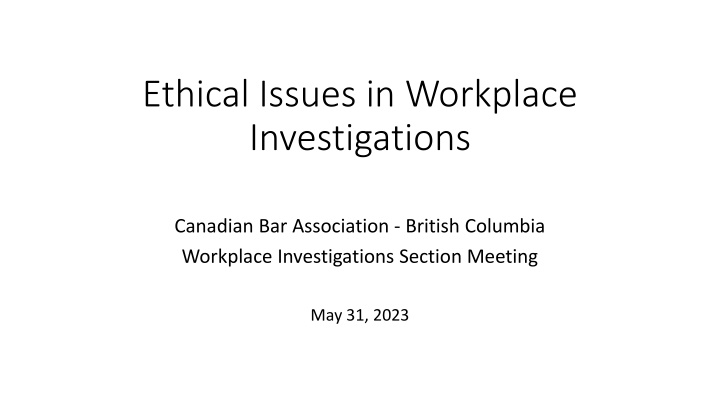
Workplace Ethics and Investigations: Handling Sensitive Cases
Explore ethical dilemmas in workplace investigations with scenarios involving sexual harassment, assault, and employee conflicts. Learn about responsibilities, boundaries, and decision-making in sensitive workplace situations.
Download Presentation

Please find below an Image/Link to download the presentation.
The content on the website is provided AS IS for your information and personal use only. It may not be sold, licensed, or shared on other websites without obtaining consent from the author. If you encounter any issues during the download, it is possible that the publisher has removed the file from their server.
You are allowed to download the files provided on this website for personal or commercial use, subject to the condition that they are used lawfully. All files are the property of their respective owners.
The content on the website is provided AS IS for your information and personal use only. It may not be sold, licensed, or shared on other websites without obtaining consent from the author.
E N D
Presentation Transcript
Ethical Issues in Workplace Investigations Canadian Bar Association - British Columbia Workplace Investigations Section Meeting May 31, 2023
Charlene Cleary, Westshore Law Sharon Cartmill-Lane, Pearlman Lindholm Jessica Thomson, Pulver Crawford Munroe LLP Jacqueline Beltgens, Beltgens Law (Chair)
SCENARIO 1 You have been retained to investigate a claim of sexual harassment in the workplace. The allegation is serious with a strong probability of significant reputational and emotional damage to the complainant as the respondent who is also a co-worker has disclosed intimate information to others in the workplace. Although you have expressly stated the complainant may bring a union rep or uninvolved support person to attend their initial interview with you the complainant has chosen to attend their virtual interview alone. During the course of the interview the complainant discusses the impact the situation has had on them. They disclose they feel humiliated by the event and very isolated. They indicate that at one point during the events leading up to the investigation they had a plan to engage in self harm. They also share that they have few if any friends or family for support. Over the course of the interview, you question the complainant s mental health given the seriousness and stress of the situation. Although the complainant works in a field where they would know of resources they could engage for the emotional toll this is taking, you remind them of the employer s EFAP and suggest that they consider some self-care. Have you done the right thing should you do more? Do you have an ethical obligation to bring this to the employer if so, how and when?
SCENARIO 2 You are investigating a claim of sexual assault in the workplace between co-workers. There are no witnesses, no surveillance, no helpful documentation it is a he said/she said situation. Both parties present as equally credible overall. As the investigator you are at a deadlock both versions of events are equally probable. Do you end your inquiry and find that the allegation is unsubstantiated? Or do you have an obligation to independently (and unsolicited) seek out other information? If so, how do you go about doing that? (do you search on the internet by searching the parties social media profiles (facebook, Instagram, twitter) and other electronic sources such as the court registry?) When is that going too far?
SCENARIO 3 An institutional client you have worked with before approaches you to conduct a workplace investigation. It involves a situation where two employees engaged in a screaming match in the hallway following a Monday morning budget meeting. There were multiple witnesses. Both employees have submitted complaints with the employer, alleging bullying and harassment against the other. Their names are Robert and Bill. You immediately recognize the name of one complainant, named Robert. He was the complainant in an investigation you conducted about four years ago for the same client. You remember little about the facts from the investigation and would have to dig out the report to jog your memory. You have never heard of the other Complainant and the proposed witnesses are also people you've never met or spoken with as Robert now works in a different department than he did four years ago. Should you take on the investigation? If you do proceed, what steps can you take to address any concerns?
SCENARIO 4 Start with same fact pattern from Scenario 3 EXCEPT, you have never met anyone before and did not conduct a prior investigation. You proceed with the investigation, and you interview Robert first. Then, in the interview with Bill, Bill tells you two things: 1. After the screaming match in the hallway, Robert approached Bill in the parking lot and told him to watch his back and shoved him against his car. Bill says he is terrified of Robert and leaves early to avoid ever seeing Robert in the parking lot. Bill says he feels embarrassed to tell HR because he s 6 foot 3 and should be able to take care of himself. He tells you that he has not even told his spouse this happened. Bill appears quite anxious and asks at least twice if you believe his side of the story and if you re going to be able to help him. What do you say? 2. Bill explains that Robert has been a loose cannon ever since mortgage rates started going up. Bill tells you that he heard through the office grape vine that Robert s worried the bank will take his house, he s had to take a second job, he barely sleeps and is taking medication to keep him alert at work. Robert had not mentioned any of this in the interview. Do you go back to him and ask him about this information?
SCENARIO 5 You are keen to make some changes to your practice and to take on more investigation work. In the past, you ve received a number of great referrals from Jane, a managing partner at a law firm. Jane recently contacted you to undertake a fact-finding investigation into allegations against another partner, Sandy, at her law firm. A group of associates have submitted a complaint together, and she has asked you to investigate. You have decided to take on this investigation and you ve been clear that you are an independent investigator who is tasked with making findings of fact (consistent with the terms of the retainer.) Jane has asked that you meet with all associates as a group to hear their allegations. Do you agree? You meet with complainants and obtain the details of their complaints. Some are visibly upset and describe instances where they were yelled at, and subjected to racial slurs and sexual comments. In one instance, an associate described feeling physically threatened by Sandy. After you ve interviewed the complainants, Jane asks for an off the record discussion with you. Do you engage in this off the record discussion? Jane tells you that Sandy is a well-respected litigator, and a great partner. Jane is emotional and upset that these allegations have been made against Sandy. How do you react to Jane during the meeting? What do you do about Jane s comments?
SCENARIO 6 The Board of a Not for Profit Society has reason to believe that its CEO misappropriated funds. They reported this to the police four months ago and have heard nothing further. Since then, they have put their CEO on a paid leave of absence pending investigation but the passage of time is beginning to cause concern and they want to move forward. The Board retains you to investigate. You don t know anything about the police investigation except that the Board told you that it had been reported. You have some concerns about the potential impact that your investigation may have on a criminal investigation. Do you begin your investigation? If so, what steps do you take? The CEO agrees to speak with you in response to the allegations. You let her know that she is welcome to bring her lawyer to the meeting but she declines to do so. When you sit down with the CEO and begin to speak with her it becomes clear that she isn t aware of any report to the police or possible criminal investigation. Do you share information about the report to police and the potential police investigation with her? After you have completed your investigation, you receive a call from the investigating officer asking you questions about your investigation. How do you handle this conversation with the officer?
QUESTIONS? THANK YOU.

